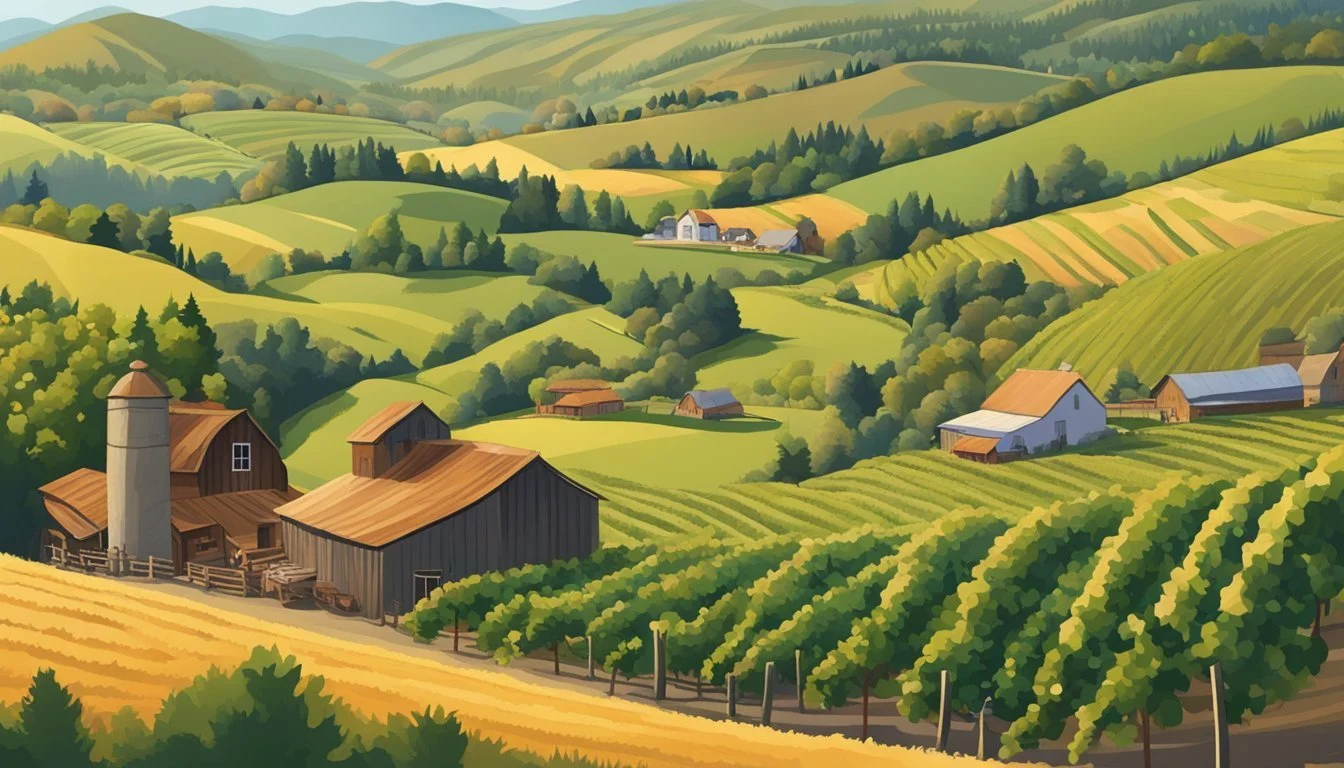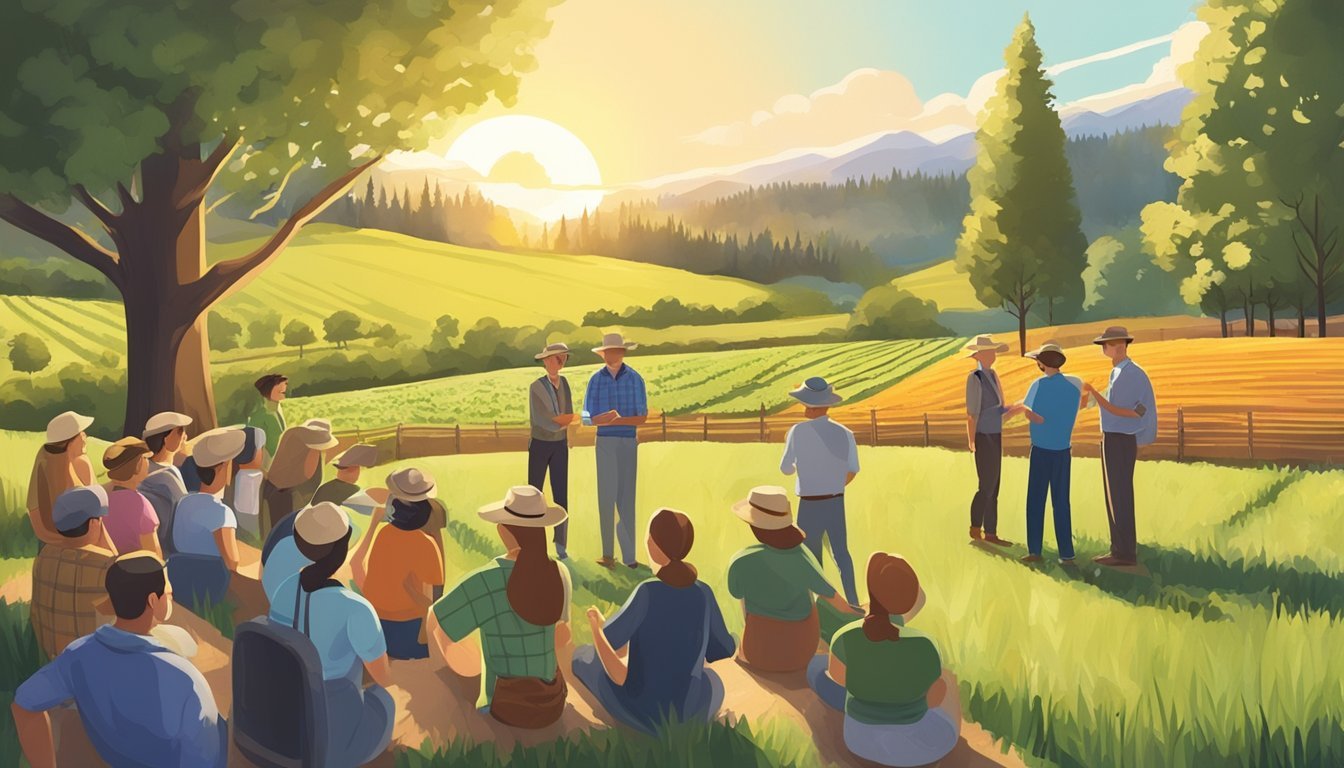Agritourism in Oregon
Experiencing the Bounty of the Pacific Northwest
Agritourism embodies a unique intersection of agriculture and tourism that is gaining traction in Oregon. It is an approach that supplements farm income through activities that connect the bounty of working farms and ranches with visitors. Oregon's agritourism allows guests to immerse themselves in the state's agricultural heritage, partake in hands-on experiences, and enjoy the scenic beauty of rural areas. From u-pick farms and farm stays to vineyard tours and harvest festivals, agritourism in Oregon offers a diverse array of experiences that support local economies and promote sustainable farming practices.
The state's agritourism network, established in 2015, works towards enhancing the quality and variety of experiences for tourists while respecting the integrity and sustainability of Oregon's farm enterprises. Their efforts, supplemented by guidance from entities such as the Oregon State University Extension Service, foster an understanding of the vital connection between farm-direct sales and agritourism. This symbiosis not only underpins the financial viability of farms but also educates consumers about the source of their food, providing an authentic connection to the land and the people who steward it.
With trails that lead to off-the-beaten-path destinations, Oregon's agritourism invites exploration into the heart of its rural community. The state's picturesque landscapes, combined with a flourishing farm-to-table culture, present an appealing narrative for those seeking to explore beyond urban precincts. Agritourism in Oregon is a testament to the enriching experiences that arise when agricultural resources are shared with a wider audience, fostering appreciation and support for local farmers and their craft.
Understanding Agritourism
Agritourism combines the essence of both agriculture and tourism sectors, offering interactive opportunities for consumers to experience farm life. It serves as a bridge connecting people to the sources of their food and fiber.
Definition and Scope
Agritourism is a niche segment of tourism that allows participants to experience agricultural life at first hand. In Oregon, it includes a variety of activities such as farm stays, U-pick fruit and vegetable operations, wine tasting, educational farm tours, and culinary events. These activities extend the scope of the traditional farming business model by incorporating aspects of education and recreation.
Agritourism's Role in Oregon
Oregon's diverse agriculture presents ample opportunities for agritourism. The state's agritourism network was established to foster high-quality experiences that bolster economic development. Activities include farm-to-table dining, interactive workshops, and seasonal festivals that celebrate local farm products. Agritourism in Oregon is not only about leisure but also serves an educational purpose, illuminating the realities of rural living and farm operation.
Benefits for Farmers and Ranchers
For farmers and ranchers, agritourism can lead to an additional revenue stream that aids in building financially viable farms. It also allows for direct farm sales, which can increase margins on farm products. Importantly, it encourages sustainable practices and resilience in the agriculture industry, as farms diversify their offerings and build networks with tourism operators and other stakeholders.
Increased revenue: Aids economic sustainability.
Educational outreach: Strengthens connections with the public.
Sustainable practices: Encourages environmentally friendly farming.
Consumer Interest in Agritourism
There is a growing consumer interest in agritourism products and experiences. People are keen on understanding where their food comes from and the processes involved in agriculture. This curiosity drives the demand for agritourism, fulfilling a desire for authentic experiences, while allowing visitors to support local agriculture and the economy. Consumers value the transparency and authenticity that agritourism provides, which in turn, reinforces the relationship between consumers and local producers.
Authentic experiences: Increases tourism attractiveness.
Support for local economy: Visitors contribute directly to local farms.
Education about food sources: Enhances consumer knowledge and awareness.
Agritourism Experiences in Oregon
Oregon is well-regarded for its bountiful agritourism offerings, providing visitors with a diverse array of farm-related experiences. From hands-on activities like U-pick to scenic vineyard tours, travelers can immerse themselves in the agricultural heritage of the state.
Types of Agritourism Attractions
Oregon's agritourism attractions encompass a range of opportunities that invite a hands-on approach to learning about and enjoying agricultural products. Many farms offer guided farm tours, allowing visitors to see where their food comes from and how it is produced. U-pick farms across the state enable families to harvest their own fruit and vegetables, such as blueberries (how long do blueberries last?) or pumpkins, fostering a connection to the land and its bounties.
Wineries and vineyards are significant to Oregon's agritourism appeal, with tours frequently paired with tastings where individuals can revel in the local flavors. Other farms may offer lodging, providing guests with a deeper rural experience. Entertainment on these farms can range from hayrides and corn mazes to the simple joy of interacting with farm animals.
Popular Oregon Agritourism Destinations
Bandon: Notable for its trails featuring a mix of U-pick blueberries, farm stands, and local eateries.
Port Orford: Offers a variety of culinary-focused farm experiences.
Willamette Valley: Renowned for its world-class wineries and extensive vineyard tours.
Hood River: Famed for orchards and fruit stand driving tours rich with outdoor recreation options.
These destinations showcase the rich tapestry of Oregon's agritourism by integrating agricultural pursuits with educational and recreational activities.
Seasonal Events and Activities
Oregon's agritourism calendar is full of seasonal events and activities that cater to a wide array of interests.
Spring and Summer:
U-pick Seasons: Strawberry, blueberry, and raspberry picking at peak harvest.
Farmers Markets: Bursting with fresh produce and local artisan products.
Fall:
Pumpkin Patches: Family-friendly destinations with a variety of pumpkin-related activities.
Harvest Festivals: Celebrating the bounty of the season, often including live music, crafts, and food.
Winter:
Holiday Markets: Offering unique, locally-crafted gifts and seasonal treats.
Wine Tasting Events: Especially around the Willamette Valley, showcasing the region's finest.
These events provide a platform for agritourism to flourish, delivering significant value to both the agricultural community and the visitors seeking authentic and meaningful rural experiences.
Starting an Agritourism Business
Entering the agritourism industry in Oregon demands careful planning, adherence to regulations, and utilization of available resources to ensure successful development. It involves strategies for effective marketing and delivering top-notch customer service.
Planning and Development
Successful agritourism requires a detailed business plan that outlines the property development, marketing strategies, and customer service policies. Before initiating, entrepreneurs should assess the viability of their idea by estimating expenses associated with starting or expanding the business. Essential considerations include renovations, machinery investments, and the preparation for hosting commercial events.
Oregon Agritourism Handbook
The Oregon Agritourism Handbook serves as a comprehensive guide for establishing an agritourism venture in the state. It provides insights on:
Marketing: A critical component for attracting visitors.
Policy: Guides on hospitality best practices and customer service excellence.
Property Development: Advise on enhancing the agritourism experience.
This handbook can streamline the planning process and offers step-by-step instructions for aspiring agritourism entrepreneurs.
Navigating Regulations and Permits
Understanding and complying with local laws and regulations is paramount for an agritourism business. The process may involve:
Securing a conditional use permit if required.
Ensuring adherence to zoning laws for agricultural property.
Orienting the business with relevant regulations for safety and operation.
Special attention must be given to the rules governing land conservation and development to maintain compliance with Oregon's strict land-use policies.
Marketing Agritourism in Oregon
Marketing agritourism in Oregon involves a comprehensive approach including targeted strategies, a strong online presence, and collaborative networking. These efforts aim to attract tourists, engage customers, and create value-added experiences.
Strategies for Attracting Customers
To effectively market agritourism, it is essential to understand and connect with the target audience. Travel Oregon engages in strategic marketing to appeal to both in-state and out-of-state tourists. Providers use various tactics to draw visitors, such as hosting unique on-farm events or offering educational experiences that distinguish their offerings from competitors.
Seasonal Events: Timely promotions around events like harvest festivals or wine tastings can drive significant tourist traffic.
Educational Programs: Providing workshops or farm tours educates visitors and adds depth to their experience.
Lodging and Recreational Activities: Offering overnight stays or recreational options increases the appeal and extends the time customers spend on-site.
Utilizing Social Media and Websites
An online presence is crucial for agritourism producers in Oregon. They must leverage the power of social media and websites to connect with potential customers, showcase their offerings, and provide important visiting information.
Website Features:
Clear, compelling descriptions of the farm and its products
High-quality images and videos that capture the essence of the farm experience
Online booking systems for tours, lodging, and events
Social Media Engagement:
Regular postings on platforms like Instagram, Facebook, and Twitter with vibrant farm-related content
Interactive elements such as live streams, stories, and farmer Q&As
Hashtags specific to Oregon agritourism and local areas to increase visibility
Networking with Other Producers
Collaboration among producers can lead to more robust marketing opportunities. Networks like the Oregon Agritourism Network support producers by facilitating connections, sharing best practices, and creating joint marketing efforts.
Joint Promotions: Working alongside nearby farms to create multi-destination itineraries.
Partnerships with Local Businesses: Cross-promotion with restaurants, hotels, and retailers that can provide tourist referrals.
Agritourism Associations: Being part of associations can offer increased exposure and shared resources for individual producers.
By adopting these focused marketing strategies, Oregon's agritourism businesses can attract more customers, create engaging experiences, and build stronger brands within the thriving tourism sector.
Managing Your Agritourism Site
To excel in agritourism in Oregon, site managers must prioritize robust visitor experiences, ensure safety, and foster revenue diversity. Effective management yields a successful enterprise that invites repeat visitation.
Delivering Quality Customer Service
Customer service forms the backbone of agritourism, incentivizing guests to connect with the locale's authentic offerings. Site managers should strive to:
Engage visitors with fresh experiences at farm stands or through u-cut activities.
Train staff in direct sales methods that combine personalized attention with in-depth product knowledge.
Safety and Risk Management
Visitors' safety is paramount, requiring a proactive approach in risk management. Managers should:
Regularly inspect the site for hazards.
Develop and enforce proper safety protocols.
Provide clear signage to direct guests effectively.
Diversification and Income Generation
Diversification is critical for financial resilience. Managers should consider:
Expanding into multiple income avenues such as events, workshops, or seasonal attractions.
Leveraging farm-direct sales to connect consumers with fresh, locally sourced products.
Engagement and Education in Agritourism
Agritourism in Oregon offers a unique blend of interactive opportunities to engage with the local agriculture through educational tours, awareness campaigns, and preservation efforts reflecting the state's dedication to farming and its heritage.
Educational Tours and Workshops
Oregon's agritourism integrates hands-on experiences with educational tours and workshops designed to provide visitors with knowledge about local agricultural practices. These tours often involve guided walks through the diverse Oregon landscape, allowing participants to learn directly from the farmers about sustainable farming techniques and agricultural product development. Oregon State University contributes to this educational push by extending research-based knowledge to enhance visitor comprehension and interaction with the farming process.
Promoting Agriculture Awareness
Awareness of agriculture's role in day-to-day life is a central goal of Oregon’s agritourism initiatives. By hosting farm tours, the state illuminates the journey from field to fork, emphasizing the importance and value of local agricultural products in supporting the way of life for many Oregonians. Educative events and materials aim to inform both urban and rural residents about the significance of supporting local farms and the broader agricultural sector.
Agricultural Heritage and Preservation
Agritourism in Oregon functions as a means to preserve the state's rich agricultural heritage. Initiatives involve conserving historic farmsteads, promoting heirloom crops, and maintaining the traditional landscape of Oregon's farmlands. These preservation efforts serve as a living history, educating the public on the evolution of agriculture and its lasting impact on society. Through agritourism, Oregon not only secures a future for its farming but also honors its past.
Challenges and Considerations
Agritourism in Oregon presents unique challenges and considerations for property owners and county planning departments. Factors such as land use law, potential conflicts with neighbors, and the impacts of increased traffic and noise need to be addressed carefully to ensure successful integration of agritourism businesses.
Land Use and Community Impacts
Property owners must navigate land use laws which are designed to preserve the state's agricultural land. They must consider how agritourism—such as fairs or concerts—fits into the surrounding land's intended use and any potential community impacts. For instance, a small farm engaging in agritourism may increase local traffic, possibly leading to road wear and the need for better infrastructure.
Zoning and County Planning
County planning departments play a crucial role in agritourism development. They enforce zoning regulations that differ across various counties in Oregon. Property owners are often required to obtain permits, which might involve assessments of the event's size, duration, and expected attendees. Specific statutes may dictate the types of agritourism activities permitted in each zone.
Addressing Neighbor Concerns
Conflicts with neighbors can arise due to noise, traffic, and other disruptions. Property owners should proactively engage with their community to mitigate issues. Effective measures might include setting strict event hours to reduce noise impacts or arranging off-site parking to manage traffic. Good communication with neighbors and the community is key to addressing these concerns and fostering a harmonious environment.
Agritourism Policy and Legislation
Agritourism in Oregon is shaped by specific state policies and legislation designed to foster this unique intersection of agriculture and tourism, providing regulatory frameworks and economic incentives. These legal structures ensure that agritourism activities operate within the defined parameters for safety, land use, and economic development.
Understanding State and Local Regulations
Oregon's agritourism-related regulations are framed by state statute, with ORS 215.213 and ORS 215.283 outlining allowable activities within Exclusive Farm Use Zones. These provisions facilitate farmers and ranchers in diversifying income through visitor engagement while protecting farmland. Local authorities can interpret these statutes, leading to variability in implementation, and it's critical for agritourism operators to comply with both state and local government standards.
Key Regulations Include:
Health and safety standards
Permit requirements
Tax Incentives and Benefits
The State of Oregon offers tax incentives to encourage the development of agritourism. Tax benefits can apply to properties used for agritourism under specific conditions, allowing owners to potentially lower their tax liabilities while contributing to economic growth.
Tax Advantages May Include:
Property tax reductions for farmland
Income tax credits for agritourism businesses
Advocacy and Legal Support
Several organizations provide advocacy and support for Oregon's agritourism business owners. These groups work to influence policy, offer legal guidance, and promote agritourism's role in the state's economy.
Notable Advocacy Groups:
Oregon Agritourism Network
Oregon Farm Bureau
These bodies are instrumental in representing the interests of agritourism entrepreneurs in legislative discussions and offering resources for navigating the complexities of agritourism legislation.








